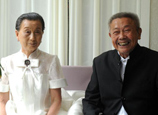
7. Both Pakistan and China recognizing the existing opportunities and the challenges, vowed to promote policies that can advance the cause of peace, co-operation, and harmony thereby creating a win-win situation in the region.
8. Both leaders reaffirmed their commitment to pursue people-centric policies that could mitigate poverty, promote social and economic development and diminish the roots of conflict.
9. The two sides decided to further deepen practical cooperation in all sectors and strengthen coordination and cooperation on international and regional issues according to the guiding principles of the Treaty of Friendship, Cooperation and Good-Neighborly Relations between the People' s Republic of China and the Islamic Republic of Pakistan signed in April 2005 and on the basis of the existing close cooperation.
10. China reaffirmed that its relationship with Pakistan was always a matter of highest priority in its foreign policy, and it would continue to strengthen this strategic partnership. China appreciated Pakistan' s long-term, staunch support on issues concerning China's core interests. China would continue to extend its full support to Pakistan in the latter' s efforts to uphold its independence, sovereignty and territorial integrity, while respecting the development path chosen by the people according to its national priority, and support Pakistan in maintaining social stability and economic development.
11. Pakistan reiterated that friendship with China was the cornerstone of its foreign policy, enjoying a national consensus. Pakistan appreciated the support and assistance of the Chinese government and people for Pakistan's sovereignty and socio-economic development.
12. Pakistan will continue to adhere to its one-China policy, oppose Taiwan and Tibet's independence and support China's efforts in combating the "Three Evils" of extremism, terrorism and separatism. We regard ETIM as our common threat and stand united in combating this menace.
13. The two sides believe that maintaining the tradition of frequent exchange of visits and meetings between their leadership, and fully leveraging arrangements such as annual meetings between their leaders, is of great importance in advancing bilateral relations. They also agreed to enhance the role of mechanisms such as Foreign Ministers' Dialogue, Strategic Dialogue and other consultative mechanisms between the relevant ministries and departments, so as to strengthen the strategic communication and coordination between the two countries.


















 'Prince's cool idea in summer': Carving on watermelon to boost sales
'Prince's cool idea in summer': Carving on watermelon to boost sales


![]()
